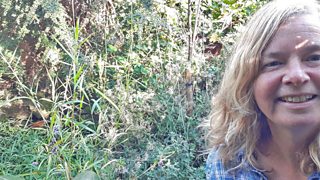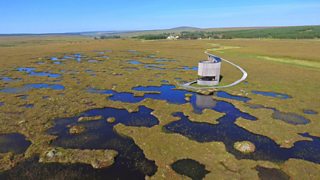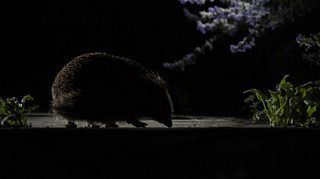Yes, we are in a nature and climate emergency – but our fate is still in our hands
RSPB
Partner organisation of the Watches
By Beccy Speight, Chief Executive of the RSPB
It can feel daunting at times, but never forget, individually and collectively we can all take action for nature, whether in our homes, on our doorsteps, or in our local spaces.
Throughout the lockdowns I was fortunate enough to spend time in my garden, appreciating the nature around me, my senses enriched by the swooping, buzzing and singing of the wildlife but it was missing a pond. So I set myself the goal of creating one, knowing it would entice a wide array of visitors. Within weeks, a flock of redpolls was visiting every day for a general spruce up and within months, it was teeming with tadpoles.

Beccy in front of her new pond - it's in there somewhere!
I’ll spend hours enjoying my new pond. It also means I’ve taken action for nature. And so can everyone else. Tackling the nature and climate emergency means working at both ends of the telescope – achieving global systemic change in things like our energy, economic and food systems but also contributing as individuals in our own lives. At the RSPB we call this ‘the bird's eye view’ – seeing the big picture but also working on the detail. We do both.
The climate alarm has finally awoken the world
The world is finally realising the catastrophic consequences of this emergency. The global meetings of COP26 in Glasgow, and the equally important COP15 on biodiversity in China next spring, are perhaps humanity’s last chance to turn words into financed actions, limit warming to 1.5°, protect and restore our precious wildlife and leave the planet in a state fit for future generations to thrive.
Taking action for nature
It can seem overwhelming but we must hold on to hope and believe we can all make a change, individually and by acting together. Of course, governments, businesses and financial institutions must alter the course of the future at a global level and steer us towards a net zero and nature positive trajectory. But our actions matter too. You may have bought peat-free compost when you visited the garden centre – a simple but crucial action in the global fight. Our peatlands are vital, precious carbon stores as well as superb habitat for wildlife.

Peat bogs, such as at RSPB Forsinard Flows in Scotland, are some of our most vital habitats for storing carbon (RSPB Images)
Maybe you’ve chosen to eat differently, buying less and better sourced meat, supporting nature- friendly farming. Sometimes, helping requires no effort at all, like choosing not to mow your lawn or leaving an area of your garden wild. This offers cover for insects in the long grass and a wildflower banquet for pollinators.
Access to our natural world is more important than ever
The last 18 months have reinforced the importance of access to nature rich green spaces for both our physical and mental wellbeing. If you can, getting involved in local community projects, from planting trees to putting up swift nest boxes is a great way to meet likeminded people and realise what we can achieve together when we make space for nature and aim to revive our world.

Hedgehog highways bring communities together and provide safe corridors for hedgehogs looking for food and a mate (Image by Wendy Ball Flickr
More than a million people took part in the RSPB’s Big Garden Birdwatch in January, increasing their knowledge of the nature on their doorstep and helping our understanding of what is happening to some of our most common birds.
The climate and nature emergency is an enormous challenge – but together, we can all take the bird’s eye view and play our part.
